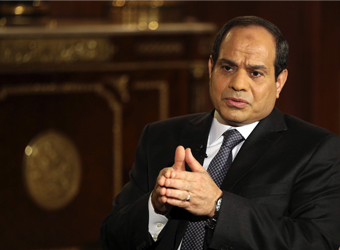Sisi told the two officials to also work towards the completion of key studies on electricity interconnection plans and projects with neighboring countries, stressing Egypt’s position on international cooperation on developmental projects, civilization development, and standards of safety and security.
During the meeting, acting PM Madbouly presented the latest developments in the start of the executive steps to establish the Dabaa nuclear plant, confirming that the first unit of the plant will begin operation by 2018, presidency spokesman Bassam Rady said.
The Dabaa nuclear power plant will produce 1,200 MW from each of its four reactors and has a 60-year operational age.
Russia will loan Egypt $25 billion to finance the nuclear power plant, the country’s first.
Electricity Minister Shaker reiterated his ministry’s target to increase Egypt’s percentage of new and renewable energy to 20% by 2022.
Shaker has also highlighted the latest developments regarding cooperation with the Italian company ENI to establish a factory of high effort convertors, and establishing Benban solar power plants, as well as a new power plant in the new administrative capital.
The minister has previously said that the Benban solar power complex is set to produce 2,000 MW, the largest amount of solar energy produced from any location.
The plant set for the new administrative capital is expected to be connected to the unified electricity network by mid 2018, to be able to generate 4800 megawatt and include 8000 workers.
In June 2015, the Egyptian government signed an 8 billion euro deal with Germany’s Siemens to construct three natural gas-fired combined cycle power plants, including one in the new capital.
The meeting also tackled ongoing energy interconnection projects between Egypt and its neighbors, such as the electricity network with Saudi Arabia, that is expected to operate by 2021, and two similar projects with Jordan and Libya, as well as clean energy projects with Cyprus and Greece.
Egypt is currently in talks with Saudi Arabia for an electricity interconnection project set for a 3000 megawatt capacity at a total investment cost of $1.56 billion.
A memorandum of understanding has also been signed for electricity interconnection between Egypt, Cyprus and Greece, for a 3000 MW capacity line.
Shaker has also pointed to the ministry’s steps to transform the electricity towers above buildings into land cables in an effort to maintain the safety of citizens, and eliminate any risks, as well as improving the service.
The recent projects to develop Egypt’s electricity grid have cost the government 483 billion Egyptian pounds, Shaker said in November. The figure does not include the cost of a nuclear power plant Egypt is preparing to build in Dabaa, in the north of the country.
Egypt has been heavily investing in its electric power infrastructure in the past three years to overcome acute shortages. Source: Ahram online
Source: Ahram online


